MAP Liberia Land Platform Annual Report 2024
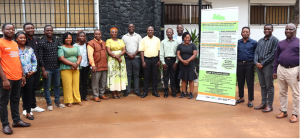
MAP Actors attending the CSOs coordination meeting in Monrovia, Photo ©MAP Liberia Land Platform
1.0 Introduction/Background
The Multi-Actor Partnership Platform on Land Governance in Liberia (MAP Liberia) was launched in February 2018 by Civil Society Organizations (CSOs), the government, and the private sector, led by the Rights and Rice Foundation. It serves as a forum for dialogue among various stakeholders to enhance land governance and promote responsible agricultural investment. The platform was initially supported by the German-funded Land for Life (LfL) Project, implemented by Welthungerhilfe and the Rights and Rice Foundation.
Executive Summary
In 2024, MAP Liberia made notable advancements in tackling land issues in the country. The government and civil society need to adopt a strategic approach to establish clear directions and ensure accountability among all stakeholders in the sector.
Activity
2.0 Training on the Dialogic Change Model (DCM) for thematic group members
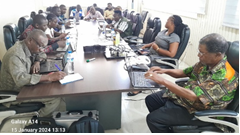 In early January 2024, the MAP actors held a one-day training for thematic group members on managing Multi-Stakeholder Partnerships (MSPs). Funded by the International Land Coalition (ILC) seed grant, the session aimed to enhance participants’ skills.
In early January 2024, the MAP actors held a one-day training for thematic group members on managing Multi-Stakeholder Partnerships (MSPs). Funded by the International Land Coalition (ILC) seed grant, the session aimed to enhance participants’ skills.
The significance of the DCM using the MSP approach
The DCM is supported by the Collective Leadership Compass, which is a diagnostic and action tool designed for planning, implementing, and evaluating collaborative change initiatives. This tool encourages collective action for systemic change and facilitates the co-creation of effective collaboration ecosystems within complex multi-stakeholder environments.
In early January 2024, the MAP actors held a one-day training for thematic group members on managing Multi-Stakeholder Partnerships (MSPs). Funded by the International Land Coalition (ILC) seed grant, the session aimed to enhance participants’ skills.
The significance of the DCM using the MSP approach
The DCM is supported by the Collective Leadership Compass, which is a diagnostic and action tool designed for planning, implementing, and evaluating collaborative change initiatives. This tool encourages collective action for systemic change and facilitates the co-creation of effective collaboration ecosystems within complex multi-stakeholder environments.
2.1 National Launch of the MAP Private Sector Engagement Strategy
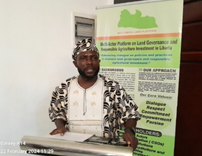
After validating the MAP Private Sector Engagement Strategy (PSES) with key stakeholders, the government of Liberia, represented by Hon. Jacob Cheategba Debee of District #3, Grand Gedeh County, launched the strategy within the framework of Responsible Agricultural Investment (RAI).
Key Recommendations:
- MAP should engage all relevant actors, including the private sector, to implement the strategy well.
- Reduce risks and financial loss.
- Ensure regular engagement with partners, businesses, and concessions
2.2 National Conference on Land Rights for Inclusive Climate Action and Sustainable Development
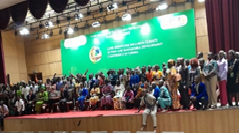
From January 30 to 31, the Platform, in collaboration with Landesa and partners planned and organized a three-day conference titled “Land Rights for Inclusive Climate Action and Sustainable Development. ” The event explored the vital link between land rights, climate change, and sustainable development. The results of the conference will be used to drive a new thematic area that will focus on a climate-smart initiative linked to land rights.
2.3 Collaboration on a Policy Brief regarding women’s land rights
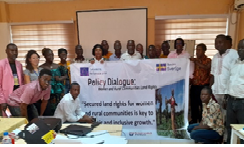
In collaboration with ForumCiv on the “Our Land” project, we held four national women’s land rights conferences in Liberia. We developed a policy brief on women’s land rights in the southeastern and western regions, validated by stakeholders and widely published to guide engagement with key players in the land sector.
At the Convener Policy Dialogue, James presented the brief, highlighting lessons from past conferences to encourage collaboration between the government and civil society.
5.0 First Quarterly Partnership Meeting with WHH and its Partners
WHH held its first quarterly meeting for 2024 to strengthen relationships with key partners and identify collaborative strategies for addressing challenges. Partners were introduced to an online learning platform with over 250 courses to enhance organizational capacity, available as long as the partnership remains active.
It was agreed that partners must submit monthly financial reports by the 5th of each month to avoid funding delays.
2.4.0 Technical forum on the LANDex baseline study on Liberia
In late March 2024, with support from the ILC, a technical session was held with Monitoring and Evaluation experts to review LANDex assessment indicators and land data systems from donor-funded projects in Liberia. The session focused on:
- Understanding existing literature and systems in Liberia and identifying the organizations involved.
- Preparing an agenda for the second National Land Conference.
- Develop a plan to review indicators and structures to establish a national land governance and tenure security data system.
2.5 Annual Membership Assembly
From May 28 to May 29, 2024, the MAP Platform held its annual assembly in Monrovia. The assembly celebrated milestones, discussed challenges, and reviewed the platform’s governance.
Outcomes of the Forum
 Through a transparent nomination process, the steering committee has been updated to include eleven members instead of twelve, representing the private sector, government, civil society, academia, and the community.
Through a transparent nomination process, the steering committee has been updated to include eleven members instead of twelve, representing the private sector, government, civil society, academia, and the community.
2.6 Validated the Gender Audit Report and reviewed the new draft of the country’s strategy.
On April 19th, the Platform met in Monrovia to validate the gender audit report and review the draft country strategy, facilitated by national consultants.
This strategy is vital for engaging stakeholders with oversight responsibilities in land and agriculture. Key participants include the Ministry of Internal Affairs, which is spearheading the decentralization of government functions under the Local Government Act.
2.7 Joint Meeting of Steering Committee and Thematic Group Members to Select Participants for LfL Phase Three Workshop in Freetown, Sierra Leone.
A workshop for the LfL Phase III program was hosted in Freetown, Sierra Leone, from July 22 to July 26, 2024. The workshop addressed key programmatic issues related to the LfL/MAP platform, focusing on challenges and sustainable solutions.
Result from the nomination process
Through a transparent process, the team nominated Madam Success Sulonkolo (SC member) and Madam Aretha K. Tokpah (Thematic Group on Women, Youth and PWDs).
2.8 Holding of Forum for Decentralized MAP in Western Region
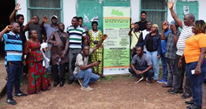
On 28 August 2024, a forum took place on the decentralized MAP platform in Grand Cape Mount County.
Key Results:
- Capacity gaps were identified, and strategies for addressing them were discussed.
- Strategic documents were reviewed and approved.
- Key areas for strengthening participants’ capabilities were documented.
- Newly elected members of the National Steering Committee (SC) representing the decentralized platform were introduced.
2.9.0 Holding of 1st SC Meeting for Newly Elected Members
After the election of new SC members in early May 2024, a meeting was held on August 23rd with eleven of them. The agenda included reviewing phase III of Land for Life’s financial support, electing co-conveners, and discussing the 2024 action plan and budget, as well as collaboration with the secretariat and other platform organs.
Major outcomes
- A new con-convener was elected to join the LLA who is a permanent member of the SC.
12.0 RAI Thematic Group meeting
To strengthen the RAI working group, the Platform held a roundtable session on August 23rd, 2024, in Monrovia. The goals were to review RAI’s activities, revitalize the group, engage new members, and align with the government’s ARREST agenda.
Action Points:
- Review the LfL budget and create an implementation action plan.
- Identify relevant stakeholders and national programs for collaboration.
- Assess the RAI private sector engagement strategy for execution.
- Work with the National Investment Commission and the Ministry of Agriculture to incorporate RAI principles into the ARREST agenda.
2.10 Liberia’s 2nd Second National Land Conference: Looking backward, looking forward two years after the first NLC
From September 23 to 27, 2024, over 200 stakeholders, including civil society organizations, government representatives, traditional and religious leaders, rural women, and academia, convened in Gompa City, Nimba County, Liberia, for the second National Land Conference.
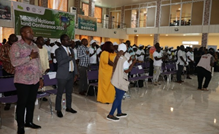
Key Outcomes:
The conference endorsed the Gompa Declaration, which includes the following recommendations:
- Develop an advocacy strategy for budget allocation that incorporates the Liberia Land Authority (LLA) and other relevant land agencies.
- Provide capacity building and technical support for community structures established by the Liberia Land Authority, especially the Community Land Management Development Committees (CLMDC).
- Assist the government in monitoring land governance and management systems.
- Strengthen collaboration with governmental and local bodies to commit to implementing the LLA Act, including developing standard operating procedures and regulations for county land boards.
- Include women, youth, and persons with disabilities in all land rights activities.
2.11 Technical meeting to formulate Climate Change and Nature Thematic Area
On Wednesday, September 18, 2024, the platform held its first technical meeting for the Climate Change and Nature Thematic Working Group.
Key outcomes included:
⮚ A list of stakeholders and ongoing programs for climate-smart actions was created, with plans to engage more participants.
⮚ National frameworks and policies were identified for review, revealing areas for intervention.
⮚ An inclusive leadership team of co-conveners for the working group was elected.
2.12 Media actors review the draft communications & visibility strategy
On 19th August 2024, media actors from various print, electronic, and online platforms convened in Monrovia to review the MAP draft communications strategy.
Key results:
- Established a network of media actors that will promote the platform’s work.
- Prepare MoU for media actors.
- Share communication strategy with the international partners for input
2.13.0 Review of the Alternative Land Dispute Resolution (ADR) on Customary Land
From 29 to 30, August 2024, Civil Society Organizations working in the land sector of Liberia in collaboration with the MAP platform held a two-day sitting to review and provide input into the draft ADR policies on Customary and private land. Twenty-five participants (8 women and 17) from various organizations were part of the exercise.
Action Points:
- The ADR law should address the issue of lateness; and,
- The ADR law should identify potential clashes.
2.14 Capacity-building support for People with Disabilities (PWDs)]\
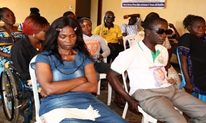
In November 2024, A capacity-building exercise was conducted for People with Disabilities (PWDs) focusing on key Land Rights Act (LRA) provisions. Despite previous awareness initiatives, PWDs continue to encounter challenges in engaging with the land sector in Liberia. These challenges include advocating for the land rights of women and girls with disabilities, understanding the organizational structure of the LLA, and recognizing the four categories of land ownership defined in the Land Rights Act (LRA) of 2018.
Recommendations
- The issues of PWDs should be included in the LRA as with women, children, and youth.
- PWDs should be represented in all land right sectors.
- Ensure that there is a mother deed for the land that you are buying.
Conclusion
MAP Liberia made significant progress in 2024 in addressing land challenges in the Republic of Liberia. The government and civil society must adopt a more strategic approach to set direction and hold relevant actors accountable.
Major Challenges:
– Limited Funding Support: Since 2017, the platform has been solely funded by Land for Life through GIZ, Welthungerhilfe, and ILC. As it enters its final phase of support, the platform faces sustainability challenges and is focused on resource mobilization.
– Limited High-Level Support: Despite achieving national recognition, the platform struggles to secure support from high-level government policymakers. Currently governed by the LLA and CSOs, there are gaps in the inclusion of other policymakers.
– Local Ownership by Members: Members are actively engaged in promoting land governance and responsible agricultural investment (RAI) through advocacy and dialogue. However, more progress is needed for shared leadership.
– Limited Private Sector Participation: Engaging the private sector has been a challenge. A new engagement strategy aims to foster robust participation and ensure responsible investment.
